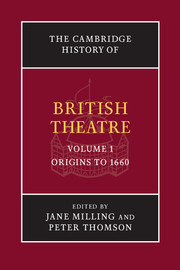Book contents
- Frontmatter
- PART I PRE-ELIZABETHAN THEATRE
- PART II ELIZABETHAN THEATRE
- 5 The development of a professional theatre, 1540–1660
- 6 Drama outside London after 1540
- 7 ‘An example of courtesy and liberality’: great households and performance
- 8 The birth of an industry
- 9 Theatre and controversy, 1572–1603
- 10 The condition of theatre in England in 1599
- 11 Ben Jonson's Every Man in his Humour: a Case Study
- 12 London professional playhouses and performances
- PART III JACOBEAN AND CAROLINE THEATRE
- Works Cited
- Index
- References
7 - ‘An example of courtesy and liberality’: great households and performance
from PART II - ELIZABETHAN THEATRE
Published online by Cambridge University Press: 28 March 2008
- Frontmatter
- PART I PRE-ELIZABETHAN THEATRE
- PART II ELIZABETHAN THEATRE
- 5 The development of a professional theatre, 1540–1660
- 6 Drama outside London after 1540
- 7 ‘An example of courtesy and liberality’: great households and performance
- 8 The birth of an industry
- 9 Theatre and controversy, 1572–1603
- 10 The condition of theatre in England in 1599
- 11 Ben Jonson's Every Man in his Humour: a Case Study
- 12 London professional playhouses and performances
- PART III JACOBEAN AND CAROLINE THEATRE
- Works Cited
- Index
- References
Summary
A prince ought also to show himself a patron of ability, and to honour the proficient in every art …Further, he ought to entertain the people with festivals and spectacles at convenient seasons of the year; …and showhimself an example of courtesy and liberality….
Niccolo Machiavelli, The PrinceTwenty years ago, a volume on early modern theatre would not have contained an essay or chapter about household performances; very likely the term ‘household’ would not even appear in the index. But ironically, an awareness of household theatre and noble patronage has always silently haunted practically every volume about Renaissance drama. Whenever a performance at court is described, whenever a travelling troupe of players is mentioned, whenever minstrels are noted, whenever an interlude is analysed, whenever the antics of a fool are admired, household performance haunts the writing. So, it turns out we have been covertly discussing this topic for some time; all it takes is a slight shift of the lens, a change from background to foreground to produce this essay and other studies of patronage.
In our own time, the students and scholars of early modern theatre have focused primarily on the plays of the public stages, but long before the existence of the Blackfriars, the Rose, or the great Globe itself, private household auspices had offered cultural experiences that differed significantly from their vastly more famous progeny. Records of Early English Drama (REED) publications are verifying that during the peak years of the London stage, performances sponsored by noble patrons in the provinces, at households and towns, were increasing, which challenges the popular notion that the public stage replaced the private. So theatre historians, perhaps under the influence of New Historicism, have turned their attention to matters contextual to printed plays, and consequently such venues as the great households of England have become a focus of study rather than an incidental footnote.
- Type
- Chapter
- Information
- The Cambridge History of British Theatre , pp. 200 - 223Publisher: Cambridge University PressPrint publication year: 2004

